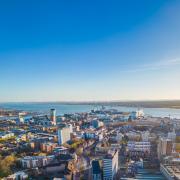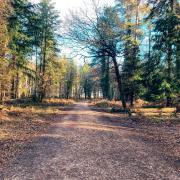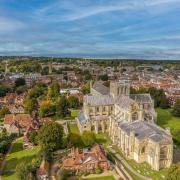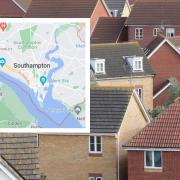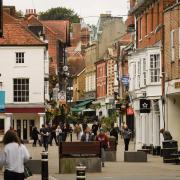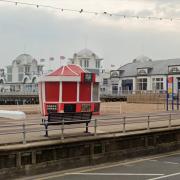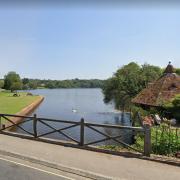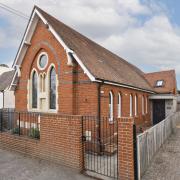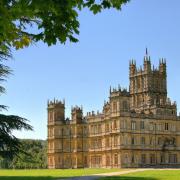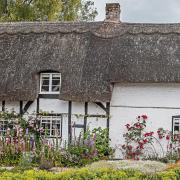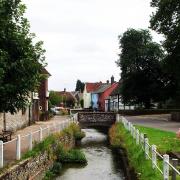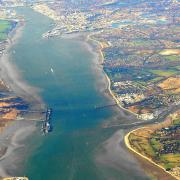Renowned for its market square and independent shops, Wickham draws in visitors and shoppers alike who are always wooed by its charms, as Carole Varley discovered
Home on the rangeHusband-and-wife team Olwen and Stephen Collet have been running Westlands Farm Shop for the past 10 years, but they started the farm that supplies it some 15 years earlier, building it up themselves from scratch.Both have lived in the area since they were small children, and while Olwen comes from a farming family, for her husband it was an ambition he fulfilled by starting off a market gardening business, which he built up into a vegetable farm, before moving over to animals. Today, they have some 400 free range pigs, a suckler herd of beef cattle and a flock of some 200 sheep. “Everything we produce goes through the farm shop,” explains Olwen. Although they do still grow a few vegetables for sale and complement the meat with a range local farm cheeses, honey, ice creams and pressed apple juices, they are mainly a butchers using traditional methods, with a nice line in pies that they have made up for them using their own recipe and their own meat, homemade sausages, burgers and traditionally-cured bacons. A family affairWhile the business now employs four people on the farm and about eight in the shop, It’s still very much a family affair with the couple’s son Graham having joined the partnership, and his partner Kayleigh, who is just finishing an agricultural degree, also hoping to come in with them. Their other son John also works in farming, in Alton. All this means that Olwen, for whom animal welfare is high on her list of priorities, can ensure that the animals are given “as natural a life as is economically viable”, as she can see them through from birth to slaughter. Her favourite time of year is spring, when all the animals can be put out to grass after the winter and “everywhere is full of new life”. Mostly, the cows and sheep manage to deliver their young quite well and “you just need to be on hand in case of an emergency”, explains Olwen, whereas the pigs, for whom it’s almost unheard of to have problems, are unhappy if people get too close at that time.There’s no doubting which are Olwen’s favourites, though. “The cows are such gentle creatures,” she says, “although they do all have their personalities. There are the grumpy ones, the ones who are no problem, and the ones who spend their lives trying to get out.” Best of all, though, is Eric, an Aberdeen Angus bull. “He’s just such a great character,” says Olwen.Shivering timbersChesapeake Mill is home to 35 different traders and is stuffed to the rafters with a unique cornucopia of collectables, antiques, jewellery, ceramics, home furnishings, gifts, cards and clothes. “You name it, we sell it. We have something here for everyone from 18 to 88”, says Sandy Taylor who has been managing it all for the past five years since her husband Anthony, together with his partner Glen Haimes, bought the Grade II Listed mill building from Hampshire County Council. In fact, with tea rooms, a new boardwalk overlooking the River Meon, and now “quite a nice little feature” in the form of a heritage centre, which has touch screens and displays telling the story of the town and mill, it has become something of a destination in itself, with sometimes more than 600 visitors a day swarming over the historical building. “It has definitely increased the visitor flow to the village itself,” says Sandy – and not just with those from the surrounding area. They also travel in from London, Guildford and even the US. This latter, rather surprising fact, has to do with those very rafters. The mill’s name gives a clue to its interesting history, in that it derives from the USS Chesapeake, a 44-gun frigate built in 1799 at Gosport, Virginia. A key player in the 1812 war with America, the ship was captured by the Royal Navy after a fierce skirmish off Cape Ann, near Boston, (the short, 12-minute battle is famous for having suffered more casualties than in any other single ship action in the history of both navies). The Chesapeake was then broken up and its timbers spotted, in 1820, by one John Prior, who bought them to support a flour mill he was building. As a result, the overall dimensions of the mill were governed by the maximum length of the ship’s deck beams which were placed there practically unaltered.Sandy and her husband Anthony, who live in nearby Southwick, both knew the mill well as children, since Anthony grew up in Wickham and Sandy in nearby Swanmore, but they never dreamt that one day they would become part of its history. Here and now, though, one of the things Sandy likes best about managing Chesapeake is the “array of people that we get here and all the different shops and their wares. You never know what is going to come in from day to day.”Links forged with the pastIn a report on R G Warwick’s Ironmongers shop in Wickham, Which? magazine wrote that this country hardware store, which purveys everything you could need for the home and garden, from paints and electrical goods, to hand-bagged organic fertiliser, bulbs and seed potatoes, was “old-fashioned in the best sense of the word. If they know what you want, they’ll get it for you”. This not at all surprising, when you discover that the business is more than 100 years old, having first been sparked into life by an ancestor of the current owner, Richard George Warwick who, as a travelling blacksmith, toured the countryside mending farmers’ ploughs and shears.It first became an ironmongers shop in Wickham’s village square (said to be the second largest in England), at the time of the First World War and was run by Richard’s grandfather, while his grandmother ran a teashop. It has been in the family ever since, with Richard, now 80, joining the business some 60 years ago, straight after national service. In fact, everything about this shop speaks of tradition and continuity. “We tend to employ people from the village and they don’t usually leave,” chuckles Richard, who goes on to explain how he swam in the river Meon as a boy with the fathers of some of the 16 or so people that they now employ in the yard and the two-storey shop. The family, however, not only owned one of the biggest shops in Wickham, but the Warwicks also featured large in the life of the village and, over the years, were involved in all sorts of projects, like the foreign holidays to the then exotic destinations such as Greece that they organised for villagers in the 1970s. Both Richard’s parents sat on the district council, and he has served on the parish council for 25 years, while his wife was chairwoman of the district council when the town’s twinning partnership with Villers sur Mer was set up. Indeed, public service seems to run in the family, and Richard’s sister, Dame Mary Donaldson, became the first – and to date – the only lady Lord Mayor of London in 1983.Rooted in tradition the business may be but, if the Which? report winds up by saying that it “reminds you of a time when people had to do things for themselves, and bought things in ones and twos rather than in pre-packs of 20,” it adds that, as those days appear to be returning, Warwick’s is also “ a shop for the times”.



